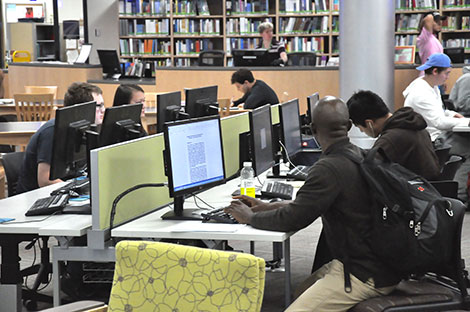Librarians can help guide your research process

Students work on research for their class projects in the Truax campus library.
October 29, 2014
This week I’ve been planting spring bulbs. There’s something satisfyingly subversive about digging in the dirt and planting bulbs right at the time when all around you the natural world is closing up shop and going to sleep. It seems misguided, an act of blind faith. How could anything possibly come of it, besides dirt under the fingernails, cold hands, and maybe a sore back?
But I know from experience that the long-term pay-off is worth all the digging and scrabbling. The rewards don’t come overnight, but they come.
Sometimes it’s helpful to look at research that way too. We live in a world of instant everything — instant results, instant feedback, instant gratification. Things happen so fast, especially in the digital environment, that it’s easy to delude ourselves that anything we want is just a mouse click away. If our computers slow down for a second, we get annoyed. If Google doesn’t yield the results we want within seconds, we feel thwarted and ready to throw in the towel.
Back when I was in library school, you knew at the start of a research assignment you were in for a long, hard slog. It was a given that it would be time-consuming, that you’d need a strategy, and that it would be a multi-step process with no immediate payback.
You knew you’d have to “dig in the dirt,” that it would at times be messy and frustrating, that it would require patience and persistence before things started to come together. Hefting huge, multi-volume indexes off shelves, hiking from one end of campus to the other, visiting different libraries in search of elusive journal articles, filling out interlibrary loan requests, and chasing down critical resources were all par for the course.
But one big advantage of old-style, pre-digital age research was that very time commitment it demanded of the student. All those hours spent crisscrossing campus, tracking down sources, working around a library’s hours of service (no online access back in the day) provided a built-in incubation period, time in which ideas could percolate and develop into something worth putting down on paper.
Some would say today’s students have it easier. I’m not so sure. Certainly there’s less physical legwork; having resources available online makes aspects of the research process less arduous and labor intensive. And the relative ease of access to so much material makes it tempting to imagine that the research itself will require less mental effort.
But while the method of access has changed, the essence of research has not. It’s still a long, hard slog. The days of poring over heavy indexes, navigating card catalogs and crisscrossing the campus in search of sources are long gone, but ideas still need time to percolate and develop, a chance to be slept on, to rearrange themselves into a cohesive whole before they are ready to be articulated.
That need for time to think, to wait for ideas to form and mature is strangely at odds with the pace of the online environment in which most college-level research is conducted these days. The very slowness of that part of the process takes many students by surprise.
At Madison College librarians are there to guide you through the research process, offering help in navigating the journal databases, suggesting appropriate search terms, and steering you toward the best resources. But you’ll still have to put in the time, be willing to get your hands dirty, and persist when it seems like the payoff is slow In coming.
So start early and be patient. Just like spring bulbs planted in the fall that don’t garner results until two seasons later, the rewards don’t come overnight, but they come, and they are worth waiting for.































